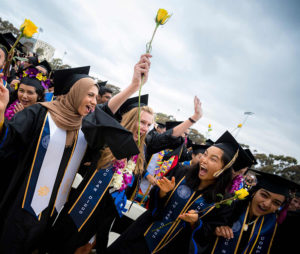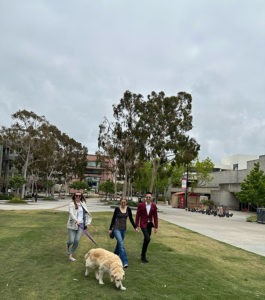Triton Alumni Shine on 2025 Forbes 30 Under 30
Pushing the boundaries of engineering and entrepreneurship, three UC San Diego alumni from the Jacobs School of Engineering have earned spots on the 2025 Forbes 30 Under 30 lists for their groundbreaking work. Liz Izhikevich, Sai Zhou and Mohammad Alkhadra have each forged unique paths in their respective fields—internet security, biomedical engineering and critical minerals—and are translating their academic research into real-world impact. From revolutionizing lithium extraction to securing satellite networks and advancing wearable ultrasound technology, these alumni exemplify the spirit of curiosity that makes UC San Diego a global hub for cutting-edge research and innovation.
UC San Diego Today sat down with each of this year’s recipients to learn about their work, the value of this milestone achievement and how their formative years as Tritons led them to where they are today:

When Liz Izhikevich set out to study internet security, she didn’t expect her research to have far-reaching implications for networks orbiting the Earth. But now, as an assistant professor of electrical and computer engineering at UCLA and a research scientist at Censys, she is redefining how researchers detect security threats on the internet—both on the ground and in space. Her work has even helped improve video streaming for over a million satellite broadband users, a discovery that helped earn her a place on the Forbes 30 Under 30 Science list for 2025.
Izhikevich’s path to this recognition began at UC San Diego, where she earned her bachelor’s and master’s degrees in computer science. To this day, her connections to the Triton community remain strong: she keeps in close contact with her former advisors (CSE/CNS faculty, Geoff Voelker and Stefan Savage), collaborates with faculty on ongoing research and visits her sister, Katherine, who is currently pursuing a Ph.D. in computer science. 
While earning her Ph.D. at Stanford University, Izhikevich deepened her research on internet security, studying exposed services and building scanning systems to analyze vulnerabilities. Then, when preparing for her qualifying exam—which required her to present on an adjacent topic—she took an unexpected turn.
“I started looking into the data that I had already collected from my internet scanning research, and I had this idea—was there any data in my existing dataset that somehow relates to satellite networks?” she recalled. Her hunch proved correct: there were exposed services in the Starlink-SpaceX network already in her dataset—she just hadn’t filtered for them.
That revelation led her team to develop a new method to track satellite network performance, and the practical applications of this work soon became apparent. Their research revealed that over a million people stream Netflix over Starlink, leading to collaborations to optimize video algorithms for satellite networks.
Today, Izhikevich leads the Security and Networking (ScaN) Lab at UCLA, where she and her students apply data-driven methods to study internet security and performance.
“I love interacting with students,” she said. “I rely on them for thinking about the world in creative ways and proposing creative solutions. I think it’s key to have all these young minds who see the world slightly differently, to be able to essentially pitch in and propose ideas—that’s how we push science forward.”
Returning to the UC system last July felt like coming “home” for Izhikevich. “On these UC campuses, you just feel it in everyone’s bones. Everyone’s there with a purpose. The students are very driven and motivated. I love the UC crowd,” she said.
Her time at UC San Diego instilled in her not just technical expertise but a sense of balance—an ethos she says is embodied by Earl Warren College’s motto, “Toward a life in balance.” “The computer science department really instills that as well,” Izhikevich said, adding that it’s something that she hopes to inculcate in the students working in her lab at UCLA. A daily yoga practice, which she started during her undergraduate years, remains an integral part of her routine.
Beyond academic circles, Izhikevich sees her Forbes recognition as validation of her work.
“It shows that there is real impact being made,” she said. Whether optimizing satellite networks or guiding the next generation of computer scientists, Izhikevich is helping shape the future of internet security—one connection at a time.
See the full story: https://today.ucsd.edu/story/triton-alumni-shine-on-2025-forbes-30-under-30-list
Story by:
Sara Bock – sbock@ucsd.edu
